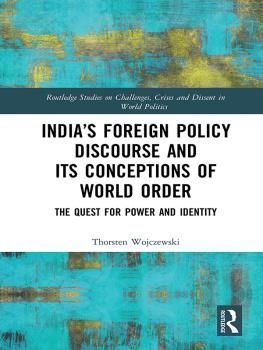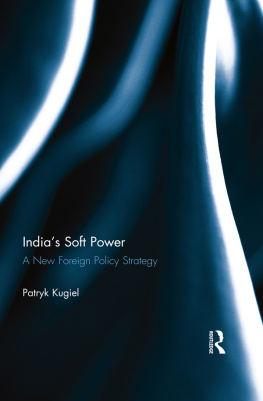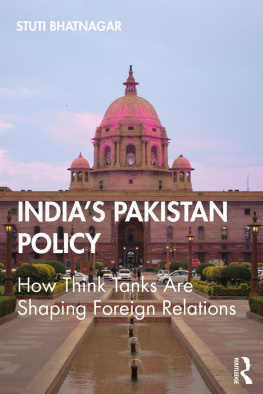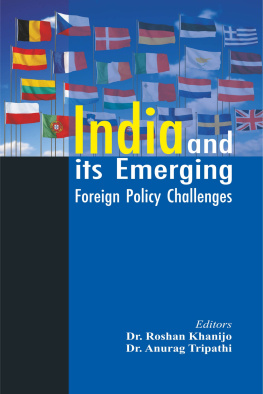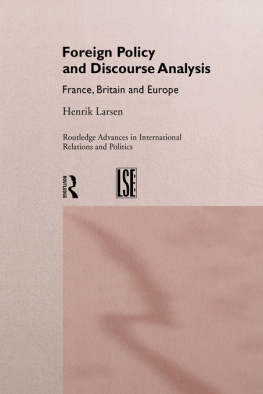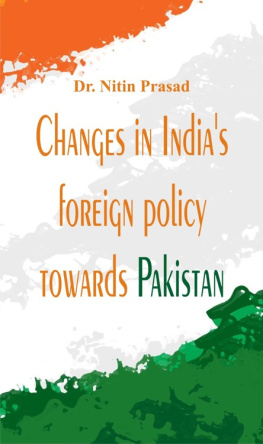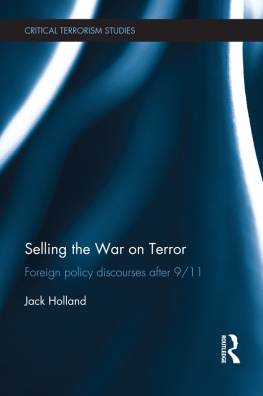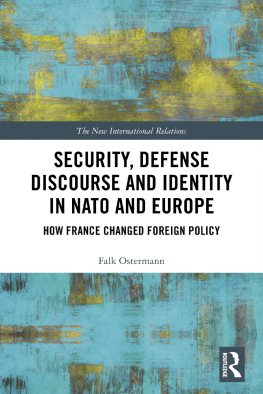Indias Foreign Policy Discourse and its Conceptions of World Order
Given Indias growing power and aspirations in world politics, there has been increasing interest among practitioners and scholars of international relations (IR) in how India views the world.
This book offers the first systematic investigation of the world order models in Indias foreign policy discourse. By examining how the signifier world order is endowed with meaning in the discourse, it moves beyond Westerncentric IR and sheds light on how a state located outside the Western core conceptualizes world order. Drawing on poststructuralism and discourse theory, the book proposes a novel analytical framework for studying foreign policy discourses and understanding the changes and continuities in Indias post-cold war foreign policy. It shows that foreign policy and world order have been crucial sites for the (re)production of Indias identity by drawing a political frontier between the Self and a set of Others and placing India into a system of differences that constitutes what India is.
This text will be of key interest to scholars and students of Indian foreign policy, foreign policy analysis, South Asian studies, IR and IR theory, international political thought and global order studies.
Thorsten Wojczewski is a Teaching Fellow and Postdoctoral Researcher at the India Institute, Kings College London, UK.
Routledge Studies on Challenges, Crises and Dissent in World Politics
This new series focuses on challenges, crises and dissent in world politics and the major political issues that have surfaced in recent years. It welcomes a wide range of theoretical and methodological approaches including critical and postmodern studies, and aims to improve our present understanding of global order through the exploration of major challenges to inter/national and regional governability, the effects of nationalism, extremism, weak leadership and the emergence of new actors in international politics.
For more information about this series please visit: .https://www.routledge.com /Routledge-Studies-on-Challenges-Crises-and-Dissent-in-World-Politics/bookseries/CCDP.
Series editors: Karoline Postel-Vinay, Centre for International Studies and Research (CERI), France, and Nadine Godehardt, German Institute for International and Security Affairs, Germany.
Crisis and Institutional Change in Regional Integration
Edited by Sabine Saurugger and Fabien Terpan
Violent Non-State Actors
From Anarchists to Jihadists
Ersel Aydinli
Power-Sharing
Empirical and Normative Challenges
Edited by Allison McCulloch and John McGarry
Hegemony and Resistance around the Iranian Nuclear Programme
Analysing Chinese, Russian, and Turkish Foreign Policies
Moritz Pieper
Noncitizenism
Recognising Noncitizen Capabilities in a World of Citizens
Tendayi Bloom
Indias Foreign Policy Discourse and its Conceptions of World Order
The Quest for Power and Identity
Thorsten Wojczewski
Indias Foreign Policy Discourse and its Conceptions of World Order
The Quest for Power and Identity
Thorsten Wojczewski
First published 2018
by Routledge
2 Park Square, Milton Park, Abingdon, Oxon OX14 4RN
and by Routledge
711 Third Avenue, New York, NY 10017
Routledge is an imprint of the Taylor & Francis Group, an informa business
2018 Thorsten Wojczewski
The right of Thorsten Wojczewski to be identified as author of this work has been asserted by him in accordance with sections 77 and 78 of the Copyright, Designs and Patents Act 1988.
All rights reserved. No part of this book may be reprinted or reproduced or utilised in any form or by any electronic, mechanical, or other means, now known or hereafter invented, including photocopying and recording, or in any information storage or retrieval system, without permission in writing from the publishers.
Trademark notice: Product or corporate names may be trademarks or registered trademarks, and are used only for identification and explanation without intent to infringe.
Library of Congress Cataloging in Publication Data
Names: Wojczewski, Thorsten, author.
Title: Indias foreign policy discourse and its conceptions of world order: the quest for power and identity / Thorsten Wojczewski.
Description: Abingdon, Oxon ; New York, NY : Routledge, 2018. | Series: Routledge studies on challenges, crises and dissent in world politics | Includes bibliographical references and index.
Identifiers: LCCN 2018003047| ISBN 9781138297180 (hardback: alk. paper) | ISBN 9781315099460 (ebook)
Subjects: LCSH: IndiaForeign relations. | IndiaForeign relations Philosophy. | World politics1989-
Classification: LCC JZ1737 .W65 2018 | DDC 327.54dc23
LC record available at https://lccn.loc.gov/2018003047
ISBN: 978-1-138-29718-0 (hbk)
ISBN: 978-1-315-09946-0 (ebk)
This book draws on research for my doctoral dissertation. Therefore, I would like to thank my supervisors Dirk Nabers and Patrick Kllner for their guidance, help and advice. Furthermore, I would like to express my gratitude to the Heinrich Bll Foundation for providing me with a three-year dissertation scholarship and funding my field research in India. I would especially like to thank the Institute for Defence Studies and Analyses in New Delhi, in particular Brig. (Rtd) Romel Dahiya, and the Centre for South Asian Studies at the University of Oxford, in particular Kate Sullivan, for hosting me as a visiting fellow and supporting my research activities. I would also like to thank my former colleagues at the German Institute of Global and Area Studies and my current colleagues at the Kings India Institute for their inputs and suggestions.
This book is about conceptions of world order and identity in Indias post-cold war foreign policy discourse. It examines how competing discourses are ordering the world and seek to fix Indias identity in this order. The study argues that foreign policy and world order have been crucial sites for the (re-)production of Indias identity by drawing political frontiers between the Indian Self and a series of Others and thereby placing India into a system of differences that constitutes what India is. This central question was at stake after the end of the cold war, which questioned Indias traditional non-aligned stance in international relations, and made it necessary to re-negotiate the relationship between the Self and its Others whereby Indias identity and its place in the world were re-ordered. This book explores how and why a particular understanding of India and world order could become dominant in India, and thereby sheds light on the way that India seeks to shape the world order.
It is widely believed today that the centre of gravity in world politics is shifting away from the West to non-Western1 emerging powers such as China, India or Brazil. Given their growing economic, political, diplomatic and military weight, policy-makers and International Relations (IR) scholars debate the potential implications of this power shift for the Western-dominated liberal world order and to what extent the emerging powers will engage, shape or contest this order (see Hurrell 2006; Ikenberry 2010; Acharya 2014; Paul 2016; Stuenkel 2016). Given its status as the worlds largest democracy, Indias rise has drawn increasing scholarly, policy and media attention in the last decades and raised the question: what kind of power will India become (Sagar 2009). While India is often seen as a natural partner of the United States and the West in general (see Mohan 2004; Burns 2007; Zakaria 2008), it has so far proved to be a rather difficult partner for the US (Chaudhuri 2014; Jain 2016) or the European Union (EU) (Kavalski 2016). In this context, scholars highlight the resilience of non-alignment or strategic autonomy in Indian foreign policy (Narang/Staniland 2012) and Indias role as a veto-player that has often stood up to the West in policy fields such as trade, climate or nuclear non-proliferation (Narlikar 2013) and contested the Western hegemony in international institutions and norm-building. However, India is often said to lack a strategic culture, foreign policy frameworks or a grand strategy, resulting in a rather reactive, hesitant or inconsistent foreign and security policy (Mehta 2009; Pant 2009, 2011; Chatterjee-Miller 2014).

